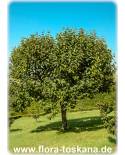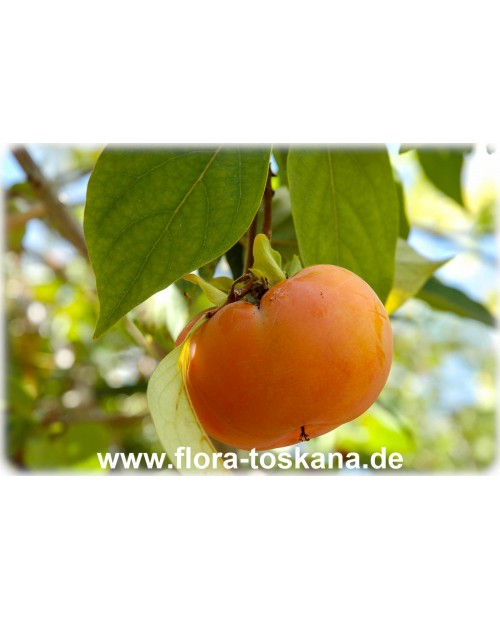Diospyros kaki XXL - Japanese Persimmon, Kaki
BESTSELLER (rank 23) - In Italy, the Persimmon variety 'Tipo' is the most common and most popular variety with dense, compact treetops and very reliable fruit set with fruits weighing around 200 grams. The crisp, orange fruits are sweet and mild delicacies that can be eaten fresh and made into delicious jams.
In Italy, Persimmon 'Tipo' (Diospyros kaki) is the most common and popular variety with dense, compact crowns and very reliable fruit set. The fruits are juicy and soft when fully ripe in November or December and reach up to 200 grams in weight. Light frost does not harm the fruits, but aids the removal of astringency from persimmon fruits.
![]() General information on Persimmon (Diospyros kaki):"Diospyros" means "fruit of the gods". With such a name, it almost goes without saying that persimmon fruits taste heavenly. Their flesh, orange when fully ripe, is soft and juicy like jelly and melts in the mouth like pudding. The flavor is full-bodied and sweet-fruity. Note: When you buy a 'Sharon' fruit, this is also a persimmon, - more precisely an Israeli variety - but its hard flesh with only little juice is nowhere near the quality of Italian varieties, which are nearly twice as large (5-8 cm). Grafted, genuine persimmon trees start to produce fruit from the 2nd to 3rd year after grafting. The 2-2.5 cm large, yellow flowers appear in early summer. Persimmon trees are able to produce fruits without pollination (parthenocarp). These fruits are then seedless. If they are pollinated, the fruits have seeds and are somewhat larger. It is important to allow the fruit to ripen to full maturity - the skin will then yield slightly to finger pressure. Unripe persimmons are astringent, meaning that when eaten, the mouth becomes furry and numb. However, this does not apply when they are made into jams and jellies; here even unripe fruits lose their astringency. The variety 'Jiro' is not astringent, but it too should be allowed to ripen on the branches to develop its full flavor. Persimmon trees are just as suitable as permanent guests in pots as they are as conservatory trees and trees in the garden, as they have a high cold tolerance of minus -15 °C. Persimmons form round, densely leafed crowns in both sunny and semi-shady places, with foliage turning intense yellow, orange and red in fall. The leafless trees are easy to overwinter, as their light and heat requirements are minimal.
General information on Persimmon (Diospyros kaki):"Diospyros" means "fruit of the gods". With such a name, it almost goes without saying that persimmon fruits taste heavenly. Their flesh, orange when fully ripe, is soft and juicy like jelly and melts in the mouth like pudding. The flavor is full-bodied and sweet-fruity. Note: When you buy a 'Sharon' fruit, this is also a persimmon, - more precisely an Israeli variety - but its hard flesh with only little juice is nowhere near the quality of Italian varieties, which are nearly twice as large (5-8 cm). Grafted, genuine persimmon trees start to produce fruit from the 2nd to 3rd year after grafting. The 2-2.5 cm large, yellow flowers appear in early summer. Persimmon trees are able to produce fruits without pollination (parthenocarp). These fruits are then seedless. If they are pollinated, the fruits have seeds and are somewhat larger. It is important to allow the fruit to ripen to full maturity - the skin will then yield slightly to finger pressure. Unripe persimmons are astringent, meaning that when eaten, the mouth becomes furry and numb. However, this does not apply when they are made into jams and jellies; here even unripe fruits lose their astringency. The variety 'Jiro' is not astringent, but it too should be allowed to ripen on the branches to develop its full flavor. Persimmon trees are just as suitable as permanent guests in pots as they are as conservatory trees and trees in the garden, as they have a high cold tolerance of minus -15 °C. Persimmons form round, densely leafed crowns in both sunny and semi-shady places, with foliage turning intense yellow, orange and red in fall. The leafless trees are easy to overwinter, as their light and heat requirements are minimal.
![]() Quality: large & delicious fruits; thanks to grafting, reliable harvests even with young plants; round crowns; robust & cold tolerant; easy to overwinter
Quality: large & delicious fruits; thanks to grafting, reliable harvests even with young plants; round crowns; robust & cold tolerant; easy to overwinter
![]() Use: planted in the garden; in pots starting from April/ May outdoors on balcony, terrace or winter garden - during winter in the house; all year round planted in a greenhouse or conservatory
Use: planted in the garden; in pots starting from April/ May outdoors on balcony, terrace or winter garden - during winter in the house; all year round planted in a greenhouse or conservatory
Data sheet
- Family
- Ebenaceae
- Origin
- Asien (mediterran)
- Flowering period
- Spring
- Color of flowers
- Yellow
- Fruits
- Edible fruits
- Growth
- Tree
- Location
- Sunny
- winter temperature
- 5 (+/- 5) °C
- Minimum temperature
- -15 °C
- Hardiness Zones
- 8
- Height
- 4 - 5 m
Customers who bought this product also bought:








































